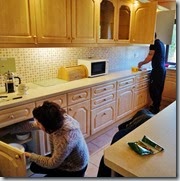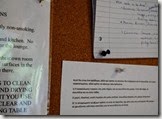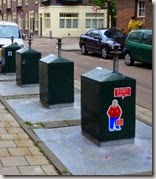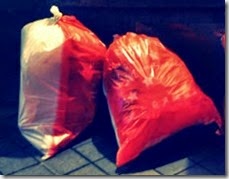 It’s been six years since I left the corporate umbrella to live independently as an expat entrepreneur in the Netherlands. I thought, at the time, that I knew 90% of what I needed to know. The actual figure was probably 10%. It’s been a long learning curve (in the UK as well), and I still find that I learn something essential every day.
It’s been six years since I left the corporate umbrella to live independently as an expat entrepreneur in the Netherlands. I thought, at the time, that I knew 90% of what I needed to know. The actual figure was probably 10%. It’s been a long learning curve (in the UK as well), and I still find that I learn something essential every day.
It’s not just the professional skills: while the columns are swapped in financial ledgers and legal procedures defy common logic, I can always hire good contract help with that. The activities of daily living are the tricky ones, because I don’t know that I’m doing anything wrong until the mistake is made.
Trash collection is the classic case study.
In the Netherlands, ordinary garbage is disposed of by purchasing red and white collection bags from the supermarket. These prepaid pickup units are set curbside weekly, where they disappear as the streets are being swept at sunrise. Recyclables are taken to collection points scattered around the city: metal, plastic, paper, white and colored glass are separated and pushed down the separate openings.
Every expat I know has at least one story where they get it wrong, bringing neighbors and landlords down on their heads.
My Dutch language exam even asked me to write a note to someone who mis-handled their garbage collection.
It’s that serious.
In the UK, things work more like the US, and life is more intuitive.
But (evidently), this is nothing like how things are done in Greece.
I returned from weekend travel to find the bins in front of the house, overflowing onto the drive. The black garbage bin was stuffed with recycling waste; the blue recycling bin was filled with unbagged kitchen scraps. Recyclables were mixed with garbage, and full trash bags from the kitchen floated in some liquid.
The trash men wouldn’t go near it.
With a sigh, I called an all-house meeting to discuss Proper Handling of Garbage.
 We began with a lot of smiles and ‘we need to change how we do things’ preamble. It sets the right tone, and its also the maximum level of English that the household understands.
We began with a lot of smiles and ‘we need to change how we do things’ preamble. It sets the right tone, and its also the maximum level of English that the household understands.
Second step, we discussed the Right Way To Do Things via Google Translate. I would type instructions (English to Greek), they would ask questions (Greek to English), and we honed things down to a three-step program.
Blue bins recycle, black garbage; Paper, plastic, glass, metal = recycle; No unbagged food waste.
Αυτό δεν είναι ένα πρόβλημα, αλλά εγώ πρέπει να εξηγήσω δύο πράγματα για τα σκουπίδια. Δεν είμαι αναστατωμένος, αλλά πρέπει να κάνουμε τρία πράγματα.
1) Η ανακύκλωσης πηγαίνει στο μπλε δοχείο, και τα σκουπίδια στο μαύρο. Η δεν θα πάρει τα σκουπίδια και αν είναι λάθος.
2) χαρτί, πλαστικό, γυαλί πηγαίνει στο μπλε continer. Σκουπίδια πηγαίνει στη μαύρη containner.
3) Τα απορρίμματα τροφίμων πρέπει να είναι σε σακούλες, όχι μόνο μπει στο conntaainer.We μπορεί να χρειάζονται καλύτερη σακούλες για τα σκουπίδια της κουζίνας.
I hope that this says what I think it should. They charmingly  printed the result and posted it on the bulletin board.
printed the result and posted it on the bulletin board.
Finally, it was gloves and bags and paper towels for the Practical Exam, in the driveway sorting the bins. There is no worse job, but everyone pitched in and we got it all sorted, bagged, and properly filed in about 20 minutes.
There was a long queue at the bathroom afterwards.
I felt like an oude bemoeial with nothing better to do. But the bin men picked up the overflowing garbage last night, so high-fives all around and ‘back on track.
Next, we are working on getting National Insurance numbers, and on how to pronounce the sounds of the letters ‘c’ and ‘s’.
It’s the little things that count. Lots of them.







